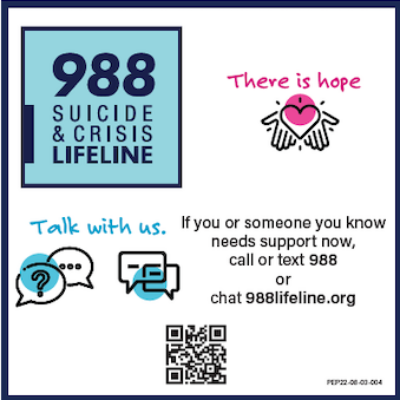Suicide Prevention and the 9-8-8 Suicide Crisis Lifeline: A Vital Resource for Parents and Communities

The devastating loss of a loved one to suicide is an unfathomable tragedy that leaves an indelible mark on those left behind. Brett Allred’s story is a poignant example of the enduring pain and profound grief that follows such a loss. In February, Allred’s 23-year-old son, Riley, died by suicide. In the aftermath, Allred discovered disturbing screenshots on Riley’s phone from a website that provided detailed instructions on how to end one’s life, which mirrored Riley’s manner of death (Trepany, 2024).
Allred’s experience underscores the critical importance of internet safety and vigilant parental oversight in preventing suicide. By raising awareness of these harmful online platforms, Allred hopes to prevent other families from enduring the same grief he faces daily. As he poignantly stated, “Every day is an absolute nightmare. I am held hostage to this situation, and nobody’s coming to pay the ransom” (Trepany, 2024).
Suicide prevention experts, like Tia Dole, Chief 988 Suicide & Crisis Lifeline Officer at Vibrant Emotional Health, acknowledge the challenges in regulating such websites due to their claims of free speech. Despite efforts by search engines to demote these sites in search results, their existence poses a persistent risk to vulnerable individuals (Trepany, 2024).
The introduction of the 9-8-8 Suicide & Crisis Lifeline offers a beacon of hope for those in distress. This lifeline provides immediate, accessible support for individuals experiencing suicidal thoughts or emotional crises. When someone reaches out to the 9-8-8 lifeline, they connect with trained counselors who offer compassionate, evidence-based care and resources to help them through their darkest moments (Dole, 2024).
For parents, the key to prevention lies not only in monitoring their children’s online activities but also in fostering open, non-judgmental communication about mental health. Encouraging children to share their feelings without fear of shame or reprimand can make a significant difference. As Dole (2024) emphasizes, “What people want to hear is, ‘I can listen to what you have to say without telling you what to do about it.’” This approach can help children feel understood and supported, reducing their susceptibility to harmful online influences.
Allred’s journey through grief and his advocacy for internet safety highlights the urgent need for increased awareness and proactive measures in suicide prevention. By leveraging resources like the 9-8-8 lifeline and fostering open dialogue about mental health, communities can work together to protect vulnerable individuals and prevent future tragedies.
In remembering Riley, Allred hopes to not only honor his son’s memory but also to inspire collective action against harmful online content. His story is a powerful reminder of the importance of vigilance, communication, and compassionate support in safeguarding our loved ones’ mental health.
For those struggling with suicidal thoughts, the 9-8-8 Suicide & Crisis Lifeline is available 24/7, offering a lifeline of hope and support. Additionally, the Crisis Text Line provides free, confidential support via text message to those in crisis by texting “HOME” to 741741.
References
Trepany, C. (2024). His son died by suicide. He wants every parent to know what he found on his kid’s phone. USA TODAY. Retrieved from https://www.usatoday.com/story/life/health-wellness/2024/07/30/suicide-prevention-dad-story-website-teen-phone/74507915007/
